eBay for iOS update includes new UI and registration via driver's license

The iOS versions of eBay’s app have been updated with a redesigned interface and a raft of other changes. The latest release improves on the stripped back UI that was available in previous versions and larger photos can now be accessed. As before, there are versions of the app available for iPad (which is version 2.3.0) and iPhone (which has reached version 3.0.0).
But there’s more than a new look to the latest version of the app. If you’re one of those people who has yet to create an eBay account, the signup process just got a whole lot easier -- if you’re in the US, that is. Forget time-consuming form filling, you can now sign up for an account with a quick scan of your driver’s license.
Google Play Music All Access is a game changer and iTunes killer
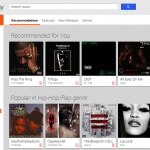
Music Piracy is now dead. Apple iTunes is now obsolete. Spotify, Pandora, Slacker -- yesterday’s news. This is all because of Google Play Music All Access. It will change the way you listen to music. It will change your life. You will subscribe. Resistance is futile. This is the future of music.
The idea of a music streaming service is not new. However, a music streaming service by the most important and influential tech company is. On May 15, 2013, Google unveiled its new music streaming service, named Google Play Music All Access. Other than the ridiculously long name (I will just call it All Access for the rest of the article), the service is near-perfect.
Gmail breaks iOS chains

Yesterday (yeah, yeah, I'm late), Google released a stunning new version of Gmail for iPad and iPhone. I tried to write this story several times on May 6, but the newsroom was short-staffed, keeping me extra busy. Vacations, bank holiday in United Kingdom and Orthodox Easter Monday just about emptied BetaNews. So, please, pardon this belated story about the great Google escape.
What a wild one, too. Control-freak Apple uses Safari to keep developers like Google in check. Especially such a rival that invades iOS with a remarkably rich set of apps tightly tied to myriad web services. So Gmail's sudden liberation is quite surprising. Links now go to installed Google apps -- gasp, Chrome, Maps and YouTube -- rather than opening Safari. Chrome linkage really is a shocker, and all the more so with Google kissing WebKit to the wind in favor of its own browsing engine. Expect it in the Chrome stable channel soon.
Tough luck Apple, non-big-brand tablets account for one-third of shipments

Apple's supremacy as tablet market leader may be even shorter lived than previous analyst forecasts suggest. Already, Android topples iOS share, and there is simple catalyst: White-box slates accounted for one-third of shipments last year -- a level NPD DisplaySearch predicts will continue in 2013 and beyond.
Android is the big beneficiary of the trend. In third quarter 2012, shipments exceeded iOS models, according to IDC. During first quarter this year, green-robot slates took 56.5 percent market share. At this pace, contrary to analyst predictions just a year ago, Android does to iOS in tablets what it did in smartphones -- take early leadership away from Apple.
History repeats, as Android does to iPad what it did to iPhone

This week IDC released tablet market estimates and the figures are quite a bit off from my original Q1 estimate, but eerily similar to my revised estimate based on NPD's figures. Android tablets are poised to permanently steal the tablet market crown from the iPad, while Windows tablets continue to struggle. Let's take a deeper look at the figures.
Android now leads the tablet market, with a share of 56.5 percent, while the iPad's share falls below 40 percent. Windows tablets are still struggling, with a share below 4 percent and with struggling shipment figures, sell-through is always questionable.
Apple closes in on 50 billion app downloads, offers $10,000 to the person who hits it

Android may rule the roost when it comes to the mobile market these days, but Apple is certainly not faring poorly with its iPhone offering. Whenever its App Store hits a new milestone the company always makes a big production of it, for both celebration, as well as publicity.
In January of 2011 the Store hit 10 billion app downloads, a milestone that took nearly three years to achieve. However, adoption increased and, in little more than a year (March of 2012), 25 billion apps downloaded was the new cause for celebration. Now, again in just over a year, that number has been doubled.
Nexus 7 lifts ASUS to third place
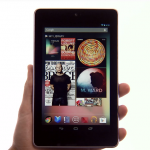
So much for Apple's tablet reign that analysts stoutly stood by even just months ago. Android kicks ass, crushing iOS shipments during first quarter, according to IDC. Among the top four, the fruit-logo company posted the lowest year-over-year growth (65.3 percent), and considerably less than the overall market (142.4 percent). Meanwhile, the company's market share fell by 18.5 points to 39.6 percent.
Among tablet manufacturers, Apple is market leader, with the question being for how much longer. Samsung share rose 282.6 percent -- ASUS even more (350 percent). Strong Nexus 7 shipments pushed ASUS past Amazon to take third place. ASUS' challenge and opportunity could be Google I/O, where the tablet launched last year and new model is rumored for the event starting May 15. Challenge is maintaining shipments during product transition; opportunity is capitalizing on new sales.
Apple Q2 2013 by the numbers: $43.6B revenue, $10.06 EPS

Today's closing bell brings answer to a question oft-asked over the past two weeks: "Will Apple profits fall for the first time in about a decade?" Not since 2003, when the fruit-logo company recovered from economic woes that sapped global PC shipments everywhere, has profit receded. Now we know.
For fiscal Q2, Apple reported $43.6 billion revenue and net profits of $9.5 billion, or $10.06 a share. Gross margin: 37.5 percent. A year earlier, the company reported revenue of $39.2 billion and $11.6 billion net quarterly profit, or $12.30 per share.
Don't blame Windows 8 for weak PC shipments
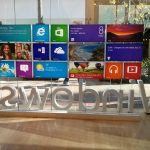
Well, well, perhaps Windows 8 isn't cause for all the PC market's woes, as IDC strongly stated yesterday. Gartner's first-quarter assessment is grim but no reaper. The analyst firm lays blame partly on consumers unwillingness to pay more for touchscreen models and asserts that the business market actually grows. Also, the firms released contradictory data, with Apple showing glaring and shocking differences.
Mikako Kitagawa, Gartner principal analyst, doesn't blame Windows 8: "Consumers are migrating content consumption from PCs to other connected devices, such as tablets and smartphones". The first factor pulling down PC shipments, which by Gartner estimates fell 11.2 percent globally during Q1, is tablet competition, then. Not Windows 8.
Papa Sangre gets a sound engine upgrade, The Nightjar coming to the US soon

If neither Papa Sangre nor The Nightjar mean anything to you, you’re missing out on some real iOS gaming greatness. Both are audio-only adventures for iOS from British developer Somethin’ Else. You don’t need any major gaming prowess to play them -- just a good pair of headphones and the ability to listen (which a lot of women will say rules out most men then).
The two very immersive games follow a similar style. You use the iPhone, iPod touch or iPad’s screen to walk forward, and swipe to turn left or right, listening for sound clues to ensure you’re headed in the correct direction -- towards something to collect or an exit, or away from some form of nasty scurrying around in the darkness.
BBC updates its news app
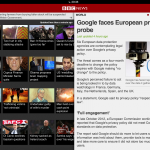
The BBC News app for iOS is pretty good but it’s always been rather buggy. The BBC debuted version 2.0 of the app late last night, and as well as bug fixes and improved response times, there have been a few other welcome changes.
Among the tweaks, the app now lets users copy story links to the clipboard, Twitter and Facebook integration has been improved, so it’s easier to share stories of interest, and pulling down on the screen refreshes the content.
How pathetic Apple has become

Phil Schiller's preemptive attack against Samsung's Galaxy S IV, which launches later today, says everything you need to hear about the sorry state of Apple. I'm stunned, because the marketing chief sounds too much like Microsoft CEO Steve Ballmer in 2007, when he dismissed iPhone. Denial is the surest sign a company has lost its way, and I don't just mean some executive denying such-and-such product or competitor is any good as distracting marketing ploy. The worst, and Schiller gives it, is corporate denial -- the proverbial ostrich with head in the sand -- about the world around.
Last night, I saw Schiller quoted in the Wall Street Journal. This morning I see posts from Bloomberg and Reuters, too, and a raff of tech blogs and news stories -- largely quoting one of the more mainstream services. The Journal calls Schiller's Android attack a "rare interview". But I see something else: Desperation. Denial. What's missing means much more: The typical leaks and rumors about Apple's next thing that steals the thunder from a competitor. Apple has nothing to show, and the InterWebs are less embracing of rumors. How pathetic is that?
Thank you, Apple -- iPad made me fall in love with Windows 8
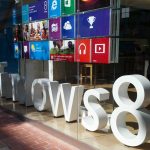
Every once in a while I find myself having to reinstall the operating system from scratch on my laptop. Unlike previous occasions when I would contemplate choosing between Windows 7 and Windows 8 as the default OS, this time around something rather strange has happened. Instead of having to deal with conflicting thoughts, and even remorse, I installed Windows 8 and never looked back. I now wear my "Windows 8 user" tag proudly and not with regret.
If you asked me whether I really want Windows 8 not much longer than two months ago I would have said that "I love and miss Windows 7" -- and for good reasons at the time. My complaints mostly focused around the Modern UI, which was designed with tablet use in mind and not for users like me (and likely you as well) that are accustomed to Microsoft's operating systems on more traditional devices like full-fledged PCs and laptops. So what changed?
What's wrong with tech in US K-12 education today

If you surveyed the different directions K-12 school districts take in the United States, you'd find nothing less than a hodgepodge of technologies. The mess that was known as "Novell Hell" universally bows down to a diverse array of technologies including Active Directory, campus-wide Wi-Fi, iPads, Chromebooks, and a little bit of everything else in between. While it's reassuring that most districts I'm in discussions with are moving to cloud-based Google Apps or Office 365 for their email, the end-user device side of things is murkier.
I'm not going to call myself an expert in K-12 technology and policy, but seeing that I spent the last four years supporting and training users' technology needs at my former high school district, I've got good experience understanding the issues affecting teachers and students alike. After attending educational tech conferences year after year, the common consensus stands: everyone in education knows where they want to be, but the paths some of them take to get there are muddled with too much idealism and not enough realism.
Apple's mini is more popular than iPad, and that's not a good thing

Nearly two months ago, when forecasting that tablets would outsell laptops this year, NPD DisplaySearch dropped dirty data bomb: shipments of slates with 7-7.9-inch screens will eclipse larger ones. Now the analyst firm puts real numbers behind the prediction, and they are grim for Apple. Talk about mixed blessings. iPad mini sizzles, while iPad fizzles. The problem: Higher sales of one takes away from the other, rather than expands demand. As such, margins are lower for the important category, likely biting Macs, too.
Panel shipments reveal the trend, and it is dramatic in just one month. "Shipments of 9.7-inch tablet PC panels collapsed, falling from 7.4 to 1.3 million, while 7-inch and 7.9-inch panel shipments grew rapidly, from 12 to 14 million", David Hsieh, NPD vice president, says. "Shipments of 10.1-inch panels grew only slightly" from December to January. Apple and Sony are the major manufacturers selling 9.7-inch tablets, the overwhelming majority iPad. Starting today, Sony sells the Xperia Tablet Z, in a move to 10.1 inches, but 9.7-inch volumes aren't high enough to account for such a dramatic shift in panel orders.
Recent Headlines
BetaNews, your source for breaking tech news, reviews, and in-depth reporting since 1998.
© 1998-2025 BetaNews, Inc. All Rights Reserved. About Us - Privacy Policy - Cookie Policy - Sitemap.